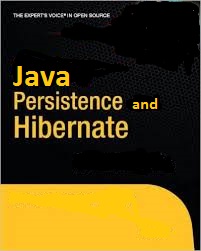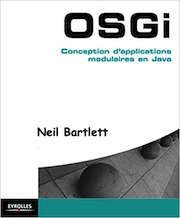
|
FreeComputerBooks.com
Links to Free Computer, Mathematics, Technical Books all over the World
|
|
- Title Guide to Java Persistence and Hibernate
- Author(s) Sebastian Hennebrueder
- Publisher: Laliluna.com
- Hardcover/Paperback: N/A
- eBook HTML and PDF (258 Pages, 2.3 MB)
- Language: English
- ISBN-10: N/A
- ISBN-13: N/A
- Share This:

|
This book is for Java developers who want to learn about Hibernate. It provides a clear introduction to the current standard for object-relational persistence in Java.
This book provides more in-depth examples than any other books for Hibernate beginners. The authors also present material in a lively, example-based mannernot in a dry, theoretical, hard-to-read fashion. And since the book keeps its focus on Hibernate without wasting time on nonessential third-party tools, you'll be able to immediately start building transaction-based engines and applications.
It is ideal for you if you're experienced in Java with databases (the traditional, or connected, approach), but are new to open source lightweight Hibernate - the most popular de facto object-relational mapping and database-oriented application development framework.
About the Authors- N/A
- Java Enterprise Applications
- Advanced Java Programming
- Introduction to Java Programming
- Java Build, Testing, and Deployment

- Guide to Java Persistence and Hibernate (Sebastian Hennebrueder)
- HTML Format
- The Mirror Site (1) - PDF
- High-Performance Java Persistence (Vlad Mihalcea)
-
 Java Transaction Design Strategies (Mark Richards)
Java Transaction Design Strategies (Mark Richards)
This book is about how to design an effective transaction management strategy using the transaction models provided by Java-based frameworks such as EJB and Spring. Techniques, best practices, and pitfalls with each transaction model will be described.
-
 Java Persistence (Wikibooks)
Java Persistence (Wikibooks)
This book is meant to cover Java persistence, that is, storing stuff in the Java programming language to a persistent storage medium. Specifically using the Java Persistence API (JPA) to store Java objects to relational databases.
-
 Dynamic Proxies in Java (Heinz M. Kabutz)
Dynamic Proxies in Java (Heinz M. Kabutz)
Dynamic proxies are such a tool that we can use it to save thousands of lines of repetitive code with a single class. This book is for intermediate to advanced Java programmers who want to get to "guru" status. It is not suitable for beginners in Java.
-
 High-Performance Java Platform Computing
High-Performance Java Platform Computing
Threading and concurrency are crucial to building high-performance Java applications. This book thoroughly demystifies them, helping developers leverage threading and concurrency to solve a wide variety of performance problems.
-
 The Java Web Scraping Handbook (Kevin Sahin)
The Java Web Scraping Handbook (Kevin Sahin)
This book will teach you how to extract data from any website, how to deal with AJAX / Javascript heavy websites, break captchas, deploy your scrapers in the cloud and many other advanced techniques, using Java programming language.
-
 Naked Objects (Richard Pawson, et al)
Naked Objects (Richard Pawson, et al)
The aim of this book is to introduce you to the concept of designing business systems from naked objects, and to enable you to start building such systems using the Naked Objects framework. It outlines a lightweight methodology and provides a short tutorial.
-
 Object-Oriented vs. Functional Programming (R. Warburton)
Object-Oriented vs. Functional Programming (R. Warburton)
This book discusses similarities between these programming paradigms and points out that both FP and OOP are actually moving closer toward one another. One prominent example is the use of lambda expressions in Java and other OOP languages.
-
 Docker for Java Developers (Arun Gupta)
Docker for Java Developers (Arun Gupta)
This book introduces basic Docker concepts and explains how to achieve faster startup and deployment of your Java‑based applications, shows how Docker containers can save you many headaches when it comes to packaging, deploying, and scaling your applications.
-
 OSGi In Practice (Neil Bartlett)
OSGi In Practice (Neil Bartlett)
This book is a comprehensive guide to OSGi with two primary goals: first introducing to OSGi concepts with examples, then exploresing numerous practical scenarios and techniques, as well as answering questions.
-
 Building Reactive Microservices in Java (Clement Escoffier)
Building Reactive Microservices in Java (Clement Escoffier)
This book is for developers and architects interested in developing microservices and distributed applications. It does not explain the basics of distributed systems, but instead focuses on the reactive benefits to build efficient microservice systems.
-
 Java Authentication and Authorization Service (JAAS) in Action
Java Authentication and Authorization Service (JAAS) in Action
By the end of this book, you will both understand and use the functionality in JAAS, and also be able to replace many of the pieces provided by the JDK or whatever application server you may be using with your own custom classes.





